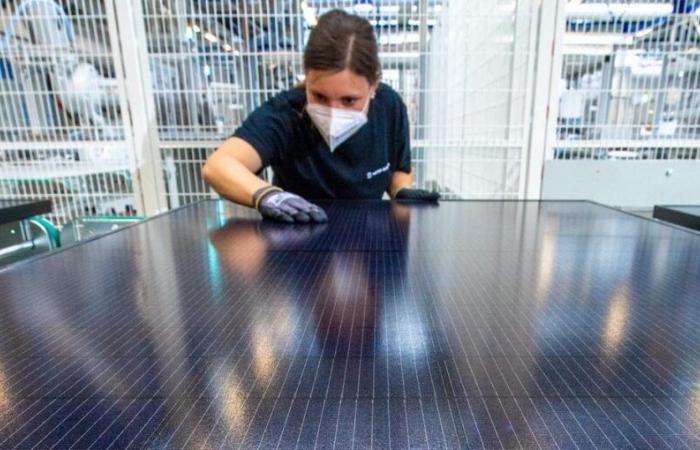Crisis at Swiss solar company –
Meyer Burger’s largest customer quits – stock trading stopped
The largest client of the solar company from Thun is terminating the contract with immediate effect and the stock exchange has stopped trading in the shares. Meyer Burger is currently fighting for survival.
Published today at 11:41 am
Meyer Burger is now planning layoffs to reduce costs: An employee at the solar company’s factory in Freiberg, Germany.
Photo: Hendrik Schmidt (Keystone)
Subscribe now and benefit from the read-aloud function.
BotTalk
The ailing solar company Meyer Burger has received bad news again. As it announced on Friday, the largest client, Desri, has terminated the contract with immediate effect.
Shortly before, it was announced that Meyer Burger’s shares would no longer be traded on the stock exchange. As the Agency awp reportsthe Swiss stock exchange SIX has suspended the Thun company.
Meyer Burger is currently fighting for survival. The solar technology company urgently needs money in order to push ahead with the planned relocation of activities to the USA and thus survive at all. As expected, the group was in the red in the first half of 2024.
“We have a financing gap in the high double-digit million range and have to close it,” said Franz Richter, who recently became CEO and Chairman of the Board of Directors, at a conference call on Friday. He is working hard on restructuring the group.
In order to get the money it needed, Meyer Burger started negotiations with creditors. “We are currently discussing things with the bondholders. We can communicate the results of this in the next few weeks,” Richter continued, without wanting to go into detail.
Meanwhile, Richter ruled out a capital increase. Analysts assume an even larger capital requirement in the range of 100 to 120 million francs.
Deep red numbers
How bad the company is doing is shown by the semi-annual report published on Friday night. Sales almost halved to 49 million francs, the operating loss (Ebitda) swelled to 124 million from 43 million francs and the bottom line was a high loss of 317 million (previous year -65 million).
Meyer Burger has been struggling for a long time with cheap competition from China and overcapacity in the European solar market. In the first half of the year, the sale of solar modules from the warehouse at dumping prices caused losses. In addition, there were depreciation and costs in addition to the stalled expansion of US production.
In September, Meyer Burger had to stop construction of a solar cell production facility in Colorado Springs because there was a lack of money. The cells will continue to be produced in Thalheim, Germany, and assembled into solar modules in Goodyear, Arizona. Activities there will be ramped up gradually in order to achieve a capacity of 1.4 gigawatts in the future.
Thanks to existing, long-term purchase agreements, Meyer Burger can already sell the solar modules produced in Goodyear and continues to expect that group sales will increase to 350 to 400 million francs and Ebitda to around 70 million by 2026. In the USA, the solar industry is being promoted and better protected from low-cost competition from China.
Job cuts in Europe
Meyer Burger’s financial situation remains extremely precarious: at the end of September there was only a good 80 million francs left in its cash register. The sale of assets from the now closed module production in Freiberg, Germany, and further sales of products from the warehouse are intended to give the group breathing room.
In addition, saving is still the order of the day. The plan is to further reduce the number of employees across the group by around 200 to 850 employees in the future. The reductions will be entirely at the expense of European activities, while jobs will be added in the USA. Richter was not yet able to say how many jobs would be lost in Switzerland.
Economy today
Get the most important news from the economy as well as the best background information and analysis.
More newsletters
Log in
SDA/van
Found an error? Report now.
0 comments






